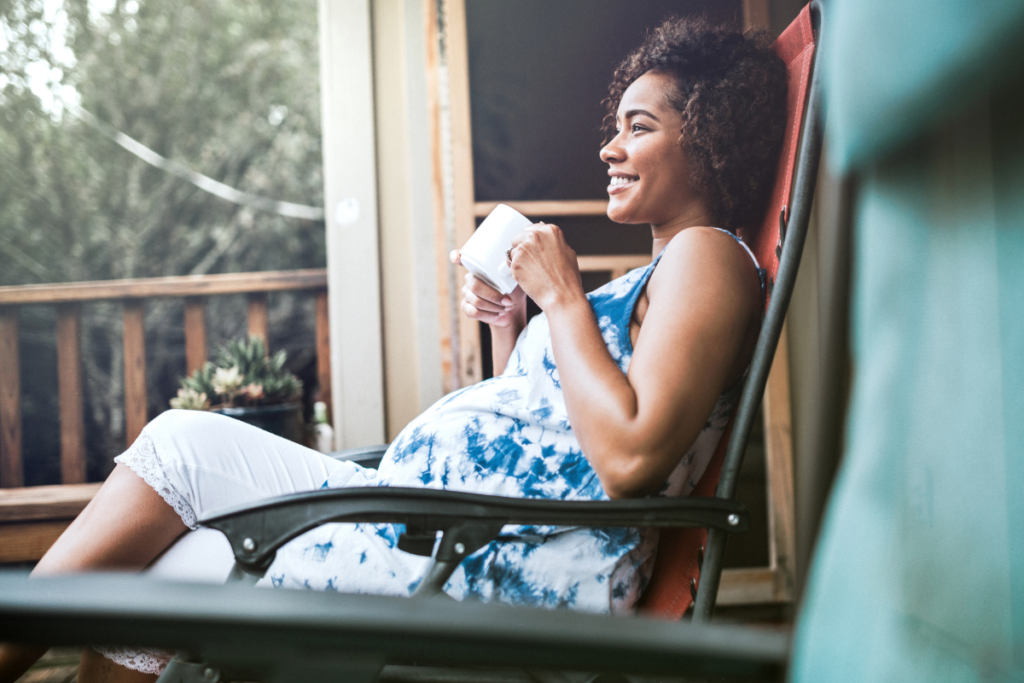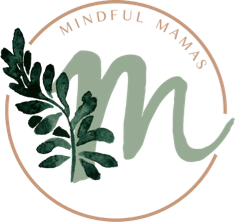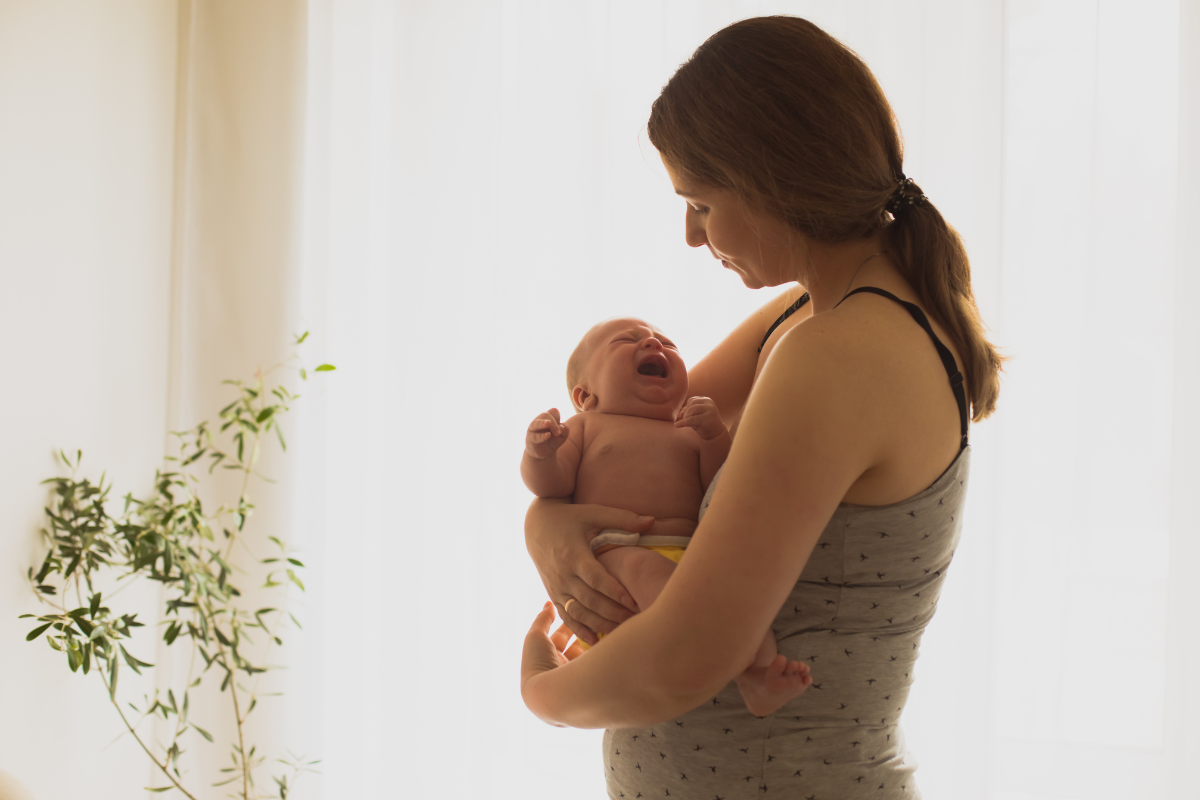Before becoming a mom, anxiety was something that narrowed and crippled my life. While living in LA in my early 20’s, when my anxiety was at its peak, I did what most people with anxiety do: I avoided.
I avoided social gatherings, public transit, crowded places, human interactions, job interviews, grocery stores, phone calls, you name it. If it brought up anxiety, I ran for the hills (or rather, hibernated in my tiny Koreatown apartment hoping no one would come to the door).
Anxiety causes us to avoid because it triggers a flight response—the result of our nervous system feeling overloaded with more than it can handle and telling our body to run away. You may notice that when you feel anxious you can’t stop moving, your heart races, your muscles tense, and you wish you could just disappear. Sounds like your body is preparing you to run, doesn’t it?
The problem with avoiding is that it does not actually complete the nervous system cycle. We’re just turning away from threat after threat (or what our body deems as a threat, like a call from an unknown number, or a party where you only know one person).
When we avoid, our life becomes smaller. Because it works in the moment, we keep doing it. We avoid and avoid and avoid, then suddenly, we only have a few places we’ll go, people we’ll talk to, and activities we’ll do.
Eventually, things that once felt safe can become anxiety-inducing. Not because they have changed, but because anxiety does not stem from the place or activity, it is sourced in the nervous system—the meeting place between the mind and body.
I found immense healing for my anxiety through mindfulness, meditation, yoga, clean eating, and processing emotions (oh, you should see my suitcase full of old journals!)
Anxiety became something I experienced occasionally—when a big life upset dropped into my lap, when I hadn’t been practicing self-care, or when I had too much caffeine. And because I had previously suffered from daily panic attacks, I had a reliable toolkit to tap into anytime I needed it. I had learned how to work with anxiety, not just push it away.
Can postpartum trigger anxiety?
I knew when I was pregnant with my son that I had a higher chance of experiencing a postpartum mood disorder because I had a history of anxiety and depression. I also thought (perhaps naively) I would be fine because of all the work I had done. There was no way I could get lost in those dark places again, right?
My son arrived after a beautiful, peaceful home birth on a sunny spring day in 2015. His arrival was an absolute joy. I was initiated into motherhood by a birthing experience that showed me my own power, strength, and tenacity. I felt like a warrior woman who now got to settle into a love cloud of joy and bliss with my new baby.
And there was a lot of joy and bliss during the first three weeks of my son’s life, but it was quickly thwarted by a storm of colic, breastfeeding struggles (from an undiagnosed lip tie), hormonal swings, sleep deprivation, a shattered identity, a lack of self-care, and a marriage that was hanging on by a thread. It was the perfect concoction for postpartum depression and anxiety.
What are the symptoms of postpartum anxiety?
Postpartum anxiety can show up in a lot of ways, it can:
- cause irritability, anger, or rage
- make it difficult to control feelings of worry
- make it hard to concentrate
- cause fatigue or restlessness
- impact your ability to fall asleep and stay asleep
Postpartum anxiety was a different animal than the anxiety I experienced before. In my early 20’s, I could get away with not leaving the house or buying groceries for a week. But as a new mother, I had to care for two people (my baby and myself) every moment of every day and night. I couldn’t avoid buying diapers or milk storage bags, and I found myself afraid yet desperate to leave the house both at the same time.
I wanted to leave my nest and be in the community again. I wanted to see smiling faces and get hugs from friends at the farmer’s market (and please, someone hold the baby for 5 minutes so I can savor these summer berries). Simultaneously, the thought of prepping the diaper bag, the baby, the car, and myself, all within a certain time frame, was one of the most anxiety-inducing things I encountered.
Questions would race through my mind, like:
- What if I don’t bring enough diapers and I run out?
- What if I bring too many diapers and I get frustrated that I packed so much?
- What if he gets sick or something terrible happens?
The list went on and on. I can look back now, from a place of contentment, peace, and hindsight, and simply have compassion for the anxious new mama I was whose mind raced with potential awful scenarios and who felt like each scenario would be the end of the world.
The truth is, the vast majority of the fear-fantasies our mind creates never come true—not even close. But an anxious mind isn’t necessarily soothed by information because when our nervous system is dysregulated, trust in ourselves, our community, and the universe doesn’t come easily.
As I climbed out of the trenches of my son’s first year of life, which was sadly also the darkest year of mine, I re-discovered the power of mindfulness, yoga, time in nature, journaling, a gratitude practice, and dedicating time to myself every night after he went to bed. I also left my husband. I remembered what helps a human be whole and well: having their needs met, feeling seen and heard, growing and developing as a person, feeling healthy and strong in their body, expressing themselves creatively, and processing emotions in a healthy way.
Unfortunately mamas don’t always get this reminder. Instead mothers are overrun by societal pressures, blue light-emitting screens, inflammatory diets, disconnection from nature and themselves, and unrealistic expectations. Of course moms are all struggling with feelings of anxiety.
It is no wonder that so many moms are suffering from postpartum anxiety.
It is no wonder that anxiety is now the most common mental health complaint.
I talk to mothers everyday who blame themselves for the concerns they feel: Mothers with 2-month-old infants who don’t understand why they have such a hard time getting out of the house. Mothers who feel incompetent because they can’t get through their schedule at work the way they did pre-baby. Mothers who think they’re failing because they struggle to accomplish their to-do list while also caring for themselves and their families.
Mama, please listen to me.
Your anxiety is real.
It is not a sign that you are not doing enough, not trying hard enough, going the wrong way, or feeling the wrong things.
You can be an amazing mother and still feel anxious.
You can be high-achieving and also anxious.
You can feel like you’re doing the absolute bare minimum to get you and your little ones through the day, and still feel anxious.
You are not weak. You are not incapable. You are not broken. You are not failing.
You are mothering in the modern world.
You are a single human being doing the work of an entire village.
How do I deal with anxiety after having a baby?

Your body, mind, nervous system, heart, and spirit, are navigating and processing so much every day. When one part of you feels like what you’re experiencing is too much, too fast, or too soon, (whether that’s looking at your seemingly endless to-do list, or holding your toddler through a tantrum, or trying to plan a “simple” family picnic) your nervous system takes over to help you balance. It says, “get out of there! This is too much right now!”
And because we’re mothers, we usually can’t get out of our environment or away from our children to quell our mind-body’s pleas.
You are not alone. Your worries, fears, doubts, concerns, and struggles are all valid. You have every right to feel what you feel, but there is hope:
Tips on How to Cope with Anxiety
When you start to feel anxious, do this Alchemize Your Anxiety process:
- Acknowledge and accept. You can say, “I feel anxious right now, and that’s okay.”
- Release. All that energy building up in your body has to go somewhere. Get it out with movements like shaking, dancing, walking, running, or yoga. You can also practice Lion’s Breath (follow along with the Mindful Mamas App), try EFT (Tapping), scream into a pillow, or sing along to a favorite song. Find one way that you can effectively release pent-up energy.
- Slow Down. Whatever you’re doing, find a way to slow your movements down, even just slightly. If you’re furiously scrubbing your kitchen counter, take a few breaths, soften your grip of the sponge, and start making slow, smooth movements. You can also slow down with slow flow yoga, walking, Integration Breath, or doing a quick body scan.
- Ground. The most effective way for your body to ground is to use the natural electrical currents of the Earth. Step outside and place your bare feet on the Earth and allow her to do the work for you as your body naturally exchanges positive ions (ones that increase anxiety) for negative ions (ones that relax you). When you can’t do that, you can ground with restorative or yin yoga, rooting visualizations, or Coming Home breath. (link to 5 ways to ground blog post).
- Reflect. There are two important questions to ask after an anxiety spiral:
- What was happening before you started to feel anxious that may have led to these feelings? Consider what you ate, what you were thinking about and what your environment was like.
- How can you support yourself so that you don’t get pulled into an anxiety spiral again today? You may like to get out into nature, schedule an appointment with a professional, call a friend, or ask someone to take care of dinner so that you can rest.
How do new moms calm down anxiety?

To downregulate: slow, still, sense, soothe, silence.
In addition to this 5-step Alchemize Your Anxiety process, it can also be helpful to support yourself with regular downregulating practices.
Downregulation is the process your nervous system undergoes in order to calm you down from an activated state. A dysregulated activation can look like fight or flight (or in this case, anxiety). A regulated activation can look like having enough energy and motivation to do the things you want or need to do.
Our nervous system naturally moves through cycles. This is one of the reasons why panic attacks can happen. The body says, “we’ve been feeling this anxiety for way too long, let’s get it all out so we can downregulate and find balance again!”
In order to support ourselves in lessening the prevalence of anxiety and working toward healing, we must create spaces for ourselves to downregulate. When you think of downregulating, think of relaxing, getting quiet, slowing down, and eventually coming to a place of stillness.
When we are feeling less anxious, we can dive right into downregulating practices without first needing to release or move through a process. You only need to find one downregulating practice that you enjoy. Make it a priority to practice it for at least a few minutes daily (or as often as you can). The more frequent, the better.
Practices to help calm anxiety
- Yin Yoga
- Restorative Yoga
- Slow Flow Yoga
- Walking Meditation
- Seated Meditation
- Yoga Nidra Meditation – this is the most down-regulating practice
- Receiving a massage or practicing self-massage
- Aromatherapy with relaxing essential oils, like lavender, frankincense, cedarwood, bergamot, etc.
- Spending time in nature
- Listening to relaxing music
- Journaling
Quick Tip for Calming Anxiety
Any activity can become one that supports downregulation by slowing it down and reducing any excess stimulation.
Here’s an example: Cleaning the kitchen.
- Slowing down your movements
- Try listening to relaxing music, affirmations (listen in the Mindful Mamas app), or binaural beats.
- Draw your focus into the sensations you’re feeling—the water flowing over your hands, how gently you can place a dish into the dishwasher, the circular movement of your hand cleaning the counter, and so on.
As you develop a relationship with loving slowness, your experience of anxiety can improve dramatically.
Anxiety, including postpartum anxiety, is not all in your head.
Anxiety is real, but it doesn’t need to be your default mode.
Remember, anxiety is normal.
You are wired for healing, and you have so much support.
To be guided through the processes we explored, and for more anxiety support, visit the Anxiety category of guided meditation in the Mindful Mamas app.
You’ve got this, and we’ve got you.



